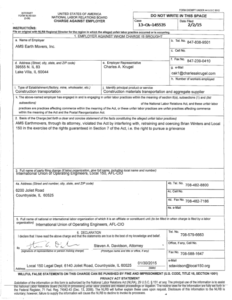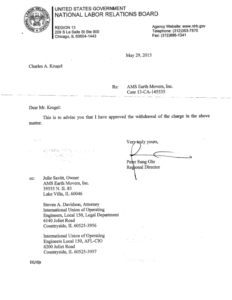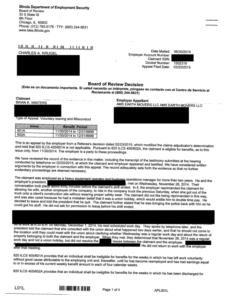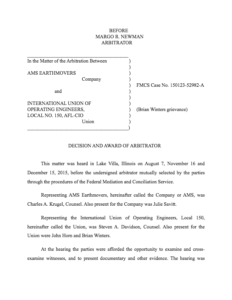We Beat Them @ Arbitration, the NLRB & Unemployment Comp. Board of Review
“Powerful” is how the Chicago Tribune describes the International Union of Operating Engineers (IUOE) Local 150 (4/24/15). They have their own in-house legal staff. They’re big labor.
A year ago, my client AMS Earth Movers & I beat IUOE Local 150 of the International Union of Operating Engineers at the National Labor Relations Board (NLRB). Recently, we learned that we beat these same parties again—2 more times in 2 different venues. We beat them at grievance arbitration & at the Illinois Department of Employment Security’s Board of Review (IDES BOR). They all concern the same case—the same union, employees, witnesses & circumstances. It’s rare to beat a union 3 times & before 3 different tribunals, especially when these tribunals exist to protect employee rights. All 3 decisions are below following my Disclaimers.
What makes these cases even more interesting is the the impact a workplace bully can have on a company, & how Local 150 attempted to prevent its own member from testifying at the IDES hearing (discussed in pp. 11-12 of the arbitration decision). That type of behavior is discussed in greater depth by me in this post. Hopefully, all 3 cases & decisions give some insight into union operations, modern labor relations, the labor litigation process across various venues & the nature of evidence. Think of it as a story of a workplace dispute from start-to-finish being told by 3 panels of judges or about 8 decision-makers in total (up to 2 at the NLRB). Here’s some factors to take note of:
- Although the IDES & the arbitrator ruled that the grievant quit AMS, the arbitrator determined that the grievant attempted to withdraw his resignation immediately afterward. Yet, due to the grievant’s behavior, we had just cause to fire the grievant a few days after he quit. Consequently, grievance denied.
- There’s some debate as to whether it’s easier to prove quitting as opposed to proving just cause like bad behavior (e.g., insubordination & bullying). In some instances, there’s a difference in the burden of proof (i.e., preponderance of evidence, clear & convincing evidence, beyond a reasonable doubt). Some argue that just cause requires evidence that’s beyond a reasonable doubt (the same as the criminal standard, i.e., we’re 99.9% sure he quit). Some contend that the lesser, preponderance of the evidence standard is required to prove quitting; i.e., we’re 50.1% sure he quit. The clear & convincing standard is in the middle at around 75%.
- At arbitration, 1 of Local 150’s own members testified that their very own union representative, who testified at this arbitration himself, threatened him with retaliation, if he testifed at the grievant’s very own IDES hearing. This is discussed in the arbitration decision on pages 11-12.
- Grievance arbitration is usually the final dispute resolution process between unions, employees & businesses. Arbitration is a 50/50 proposition most of the time. The arbitrator is a chosen by both the company & union from a listing of other arbitrators provided by the Federal Mediation & Conciliation Service (FMCS—federal agency that oversees alternative dispute resolution). Most arbitrators have a public record of their decisions, experience & public statements. It’s a transparent process & is less formal than courtroom litigation.
- Regarding giving an opening statement at a trial, arbitration, hearing, etc., some litigators advise that you should always give an opening statement. I disagree. In this arbitration, as well as in a few other proceedings, I waived giving an opening statement. The union gave a 10-minute opening statement, & we still won. I knew that based on the order I would call my witnesses, & knowing what they were going to testify to, there’s no way that an opening statement from me would add anything to their narratives. It was their testimony that would win the case, not my pontificating. Moreover, my impression was that the arbitrator, who’s very experienced, was relieved that more time would be devoted to our witnesses than my own narrative.
- The NLRB decision indicates that the NLRB “approved the withdrawal of the charge.” However, this is bureaucratic talk for dismissing the complaint without a hearing or other formalities; i.e., summary dismissal. Had there been a shred of evidence against us, the NLRB would have escalated the matter or would have involuntarily withdrawn the charge on their own (if the union refused to withdraw it). The NLRB has the reputation of being biased toward unions; this case indicates otherwise. Initially, I gave us a 30% chance of outright winning at the NLRB.
- The IDES Board of Review is the 2nd & final appellate process in the IDES’ dispute resolution process. It’s a 5 judge panel. Rightfully so, the system is designed to help ex-employees. That money is there for them. Initially, I gave us a 40% chance of winning at the BOR. We overturned the administrative law judge’s prior decision granting benefits & denying that the grievant quit. One interesting thing about this decision, & I appreciate & acknowledge the IDES BOR’s honesty in admitting this: They indicated that the record contained none of the documents that we submitted as evidence. This is troubling, & ironic, since the IDES is one of the authorities that constantly stresses the importance of documentation. Had we not filed our appeal, & resubmitted our documents, we never would have known of this absence from the record.
- IUOE 150 tried to rebut this post. See their attempt here.
Disclaimer: This post represents no findings of either criminal or civil guilt for any entity, party or person. This is the author’s opinion & for informational purposes. Results in 1 case, or even 3 cases, aren’t predictive or indicative of results in other cases. Also see my other disclaimers here.





Leave A Comment